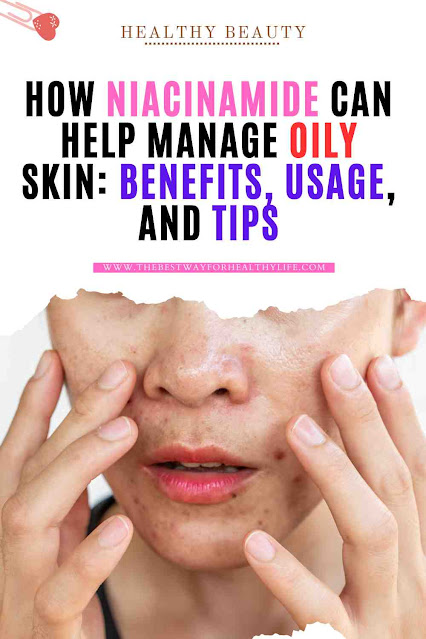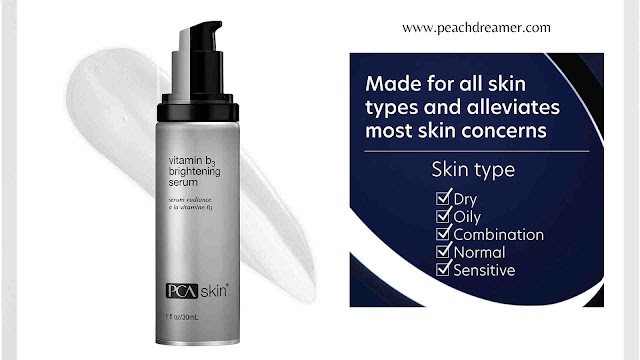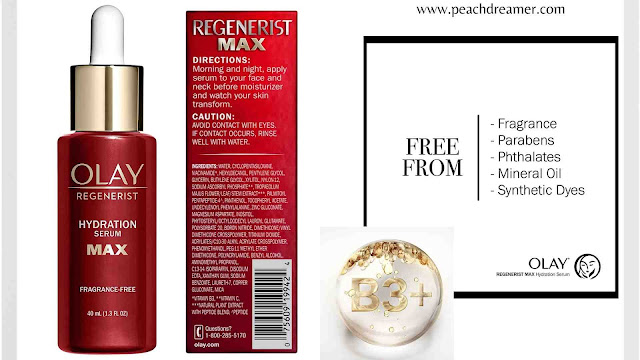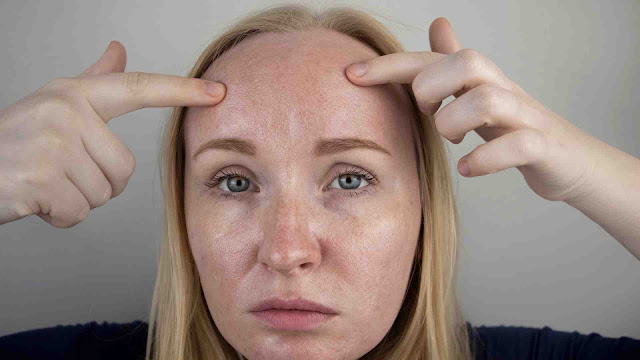How Niacinamide Can Help Manage Oily Skin: Benefits, Usage, and Tips

How Niacinamide Can Help Manage Oily Skin: Benefits, Usage, and Tips
Oily skin can be challenging to manage, leading to breakouts, enlarged pores, and an overall shiny appearance.
However, using the right skincare ingredients can help manage excess oil and keep your skin looking healthy and balanced.
Niacinamide is one such ingredient that has gained popularity in recent years due to its ability to benefit oily skin.
In this article, we'll explore the benefits of niacinamide for oily skin, how to use it, and tips for incorporating it into your skincare routine.
What is Niacinamide?
Niacinamide is a form of vitamin B3 that has numerous benefits for the skin. It can help reduce excess oil production, minimize the appearance of pores, improve skin texture, and reduce inflammation and redness.
Niacinamide can be found in various skincare products, such as serums, moisturizers, and toners. It's important to choose a niacinamide product that is suitable for your skin type and needs.
Niacinamide can be used with other skincare ingredients, such as retinoids and antioxidants. Using sunscreen when using niacinamide is crucial, as it can make your skin more sensitive to the sun.
Definition and Origins
Niacinamide, or nicotinamide or vitamin B3, is a water-soluble vitamin commonly used in skincare products due to its many benefits for the skin.
It was first discovered in the early 20th century and has become a widely studied and popular ingredient in the skincare industry.
Niacinamide is a niacin derivative, another form of vitamin B3. Unlike niacin, which can cause flushing and redness in high doses, niacinamide is generally well-tolerated and does not cause these side effects.
It is also more stable and less prone to oxidation than niacin, which makes it a popular choice for skincare formulations.
Niacinamide can be found naturally in various foods, including meat, fish, poultry, and enriched grains. It can also be synthesized in the body from tryptophan, an amino acid found in protein-rich foods.
In addition to its many benefits for the skin, niacinamide is important for overall health and well-being.
It plays a role in the metabolism of carbohydrates, fats, and proteins and is essential for producing energy in the body.
It also helps maintain healthy skin, nervous system function, and digestive health. Niacinamide is a versatile and beneficial nutrient used for decades in skincare products due to its many benefits for the skin.
Whether you're looking to reduce excess oil production, minimize the appearance of pores, or improve overall skin texture and tone, niacinamide may be a great choice for incorporating into your skincare routine.
How Does Niacinamide Benefit the Skin?
Niacinamide is effective for oily skin because of its unique properties and ability to address multiple skin concerns and helps promote a balanced, healthy complexion.
What Makes Niacinamide Effective for Oily Skin?
By regulating sebum production, minimizing the appearance of pores, reducing inflammation and redness, improving skin texture and tone, and preventing breakouts and acne, niacinamide can help those with oily skin achieve a clearer, more balanced complexion.
Benefits of Niacinamide for Oily Skin
- Reduces Excess Oil Production
Niacinamide has been shown to reduce excess oil production in the skin effectively. This is because niacinamide helps regulate sebum production, our skin's natural oil.
When sebum production is excessive, it can lead to clogged pores and acne breakouts. By regulating sebum production, niacinamide helps prevent excess oil buildup and reduces the risk of acne.
In addition to regulating sebum production, niacinamide has anti-inflammatory properties that can help calm the skin and reduce redness and irritation.
This is especially important for those with oily skin, as excess oil production can often lead to inflammation and breakouts.
Niacinamide is also a water-soluble ingredient, which means it's lightweight and won't leave a greasy or oily residue on the skin.
This makes it an excellent option for those with oily skin looking for a lightweight moisturizer or serum that won't exacerbate their skin's oiliness.
- Minimizes the Appearance of Pores
Another benefit of niacinamide for oily skin is its ability to minimize the appearance of pores. Large, visible pores are a common concern for those with oily skin and can be difficult to manage.
However, niacinamide has been shown to help reduce the size and visibility of pores, making the skin appear smoother and more even.
Niacinamide works to minimize the appearance of pores by regulating sebum production, which can often be a contributing factor to enlarged pores.
When sebum production is excessive, it can mix with dead skin cells and debris, leading to clogged pores and a rough, uneven texture.
By reducing sebum production, niacinamide helps prevent debris buildup in the pores, which can reduce pore size over time.
In addition to regulating sebum production, niacinamide also has a mild exfoliating effect on the skin. This helps to remove dead skin cells and debris from the skin's surface, which can further contribute to the appearance of large pores.
By promoting gentle exfoliation, niacinamide helps to refine the skin's texture and minimize the appearance of pores.
- Improves Skin Texture and Tone
Niacinamide is also known for improving skin texture and tone, which is especially important for those with oily skin.
Oily skin is often prone to rough, uneven texture and a dull, sallow complexion. However, niacinamide can help address these concerns and improve the skin's appearance.
Niacinamide improves skin texture and tone by promoting collagen and elastin production, essential for healthy, youthful-looking skin.
Collagen is a protein that gives the skin its structure and elasticity, while elastin is a protein that helps the skin bounce back after it's been stretched or pulled.
By promoting the production of these proteins, niacinamide helps to firm and plump the skin, reducing the appearance of fine lines and wrinkles.
In addition to promoting collagen and elastin production, niacinamide has antioxidant properties that help protect the skin from free radical damage.
Free radicals are unstable molecules that can damage the skin and accelerate aging. By neutralizing free radicals, niacinamide helps to prevent premature aging and maintain a youthful, healthy complexion.
- Reduces Inflammation and Redness
Inflammation and redness are common concerns for those with oily skin, but niacinamide can help alleviate these symptoms and promote a calmer, more balanced complexion.
Niacinamide has anti-inflammatory properties that can help reduce redness and irritation in the skin, making it an excellent ingredient for sensitive or reactive skin.
Inflammation is a natural response of the body's immune system to injury or infection, but chronic inflammation can lead to damage to the skin cells and premature aging.
Niacinamide helps reduce inflammation by inhibiting the production of inflammatory cytokines responsible for triggering the body's inflammatory response. This can help calm red, irritated skin and reduce the appearance of redness and blotchiness.
In addition to its anti-inflammatory properties, niacinamide helps strengthen the skin's natural barrier function, reducing the risk of inflammation and redness.
A healthy skin barrier helps to lock in moisture and prevent irritants and allergens from penetrating the skin, reducing the risk of inflammation and other skin concerns.
- Helps Prevent Breakouts and Acne
Niacinamide is a powerful ingredient that can help prevent breakouts and acne, making it an excellent addition to any skincare routine for those with oily skin.
One of the main causes of acne is the overproduction of sebum, which can clog pores and lead to the formation of pimples and blackheads. However, niacinamide can help regulate sebum production, reducing the risk of acne breakouts.
Niacinamide works by inhibiting sebum production, the natural oil our skin produces. By reducing sebum production, niacinamide helps prevent the buildup of excess oil in the pores, which can lead to clogged pores and breakouts.
In addition to regulating sebum production, niacinamide has anti-inflammatory properties that can help calm the skin and reduce redness and irritation associated with acne.
Another benefit of niacinamide for preventing breakouts and acne is its ability to balance the skin's pH. The skin's natural pH is slightly acidic, which helps to protect the skin from harmful bacteria and other pathogens.
However, when the skin's pH is disrupted, it can lead to the overgrowth of acne-causing bacteria. Niacinamide helps to restore the skin's natural pH balance, reducing the risk of bacterial overgrowth and acne breakouts.
How to Use Niacinamide for Oily Skin
When incorporating niacinamide into your skincare routine, choosing the right product for your skin type and concerns is important.
Here are some factors to consider when selecting a niacinamide product:
- Concentration: Look for products that contain a concentration of 2-5% niacinamide, as this is the optimal range for achieving the ingredient's benefits.
- Formulation: Niacinamide can be found in various formulations, including serums, moisturizers, toners, and masks. Consider your skin type and needs when selecting a product. A lightweight serum or toner may be the best option for oily skin.
- Additional ingredients: Look for complementary products that can further enhance the benefits of niacinamide for oily skin. For example, products that contain salicylic acid or tea tree oil can help prevent breakouts, while those with hyaluronic acid or ceramides can help hydrate and strengthen the skin barrier.
- Brand reputation: Research and choose a product from a reputable brand with a proven track record of producing effective skincare products.
- Personal preferences: Consider your preferences, such as texture, scent, and packaging, when selecting a product. You're more likely to use a product consistently if you enjoy using it.
Incorporating Niacinamide into Your Skincare Routine
When incorporating niacinamide into your skincare routine, use it once a day and gradually increase frequency as your skin adjusts.
It's also important to patch-test the product before using it all over your face to ensure you don't have an adverse reaction.
- Start Slowly and Build Up
- Pair Niacinamide with Other Complementary Ingredients
- Use Sunscreen to Protect Your Skin
- Consistency is Key
To get the best results from niacinamide for reducing inflammation and redness, it's important to use a product containing 2-5% niacinamide.
With the right product and consistent use, you can enjoy the benefits of niacinamide for oily skin and achieve a clearer, more balanced complexion.
Niacinamide Serums for Oily Skin
If you are looking for the best niacinamide product worth trying, then the below product can be your choice!
Below is niacinamide serums that can deal with your oily skin and give you healthy and radiant-looking skin.
So, let's take a closer look at each of these products and what makes them stand out:
1. The Ordinary Niacinamide 10% + Zinc 1%
The ordinary niacinamide 10% + zinc 1%
This serum is specially formulated to reduce the appearance of blemishes and congestion while balancing sebum production. The added Zinc in this formula also helps soothe and calm irritated skin.
2. Paula's Choice 10% Niacinamide Booster
 |
| Paula's Choice 10% Niacinamide Booster |
Paula's Choice is a well-known skincare brand that's loved by many. Their 10% Niacinamide Booster is a fan favorite for a reason.
This lightweight and fast-absorbing serum can help minimize pores, reduce redness, and improve uneven skin tone.
It also contains additional ingredients such as Vitamin C and Licorice Root Extract that can brighten the skin.
3. Naturium Niacinamide Face Serum
 |
| Naturium Niacinamide Face Serum |
Naturium Niacinamide Face Serum is a popular skincare product that contains 12% Niacinamide, a powerful ingredient that can benefit the skin in many ways.
This lightweight and fast-absorbing serum can help improve skin texture, reduce inflammation, and minimize the appearance of pores.
In addition to Niacinamide, this serum contains other skin-loving ingredients such as Zinc PCA, Hyaluronic Acid, and Vitamin C. Zinc PCA can help regulate sebum production and prevent breakouts.
At the same time, Hyaluronic Acid can provide deep hydration and plump the skin. Vitamin C can also help brighten the skin and improve uneven skin tone.
4. PCA Skin Niacinamide
 |
| PCA Brightening Serum |
PCA Skin is a professional skincare brand trusted by dermatologists and estheticians.
Their Niacinamide serum is a gentle yet effective formula that can improve skin texture, reduce inflammation, and help regulate sebum production.
It's also free of harmful ingredients such as fragrance and parabens, making it suitable for sensitive skin.
5. Olay Regenerist Max Hydration Serum
 |
Olay Regenerist Max Hydration Serum |
Their Regenerist Max Hydration Serum contains niacinamide and Hyaluronic Acid, a powerful hydrating ingredient that can plump up the skin and reduce the appearance of fine lines.
This serum can help improve skin texture, firmness, and radiance.
FAQs:
Q. Can Niacinamide Cause Irritation?
A. Niacinamide is generally well-tolerated by most people, but it can cause mild irritation or redness in some individuals. If you experience any irritation, reduce the frequency of use or discontinue use altogether.
To minimize the risk of irritation, it's important to patch-test any new skincare products that contain niacinamide before using them all over your face.
Apply a small amount of the product to a discreet area of skin, such as the inner wrist or behind the ear, and wait 24-48 hours to see if any redness, itching, or other signs of irritation develop.
Q. Can Niacinamide be Used with Other Skincare Ingredients?
A. Yes, niacinamide can be used with other skincare ingredients. It pairs well with other antioxidants and retinoids, but it's important to use them at different times (especially vitamin C serum) of the day to avoid any potential irritation.
Q. How Long Does it Take to See Results from Niacinamide?
A. It can take several weeks to see visible results from using niacinamide. Consistency is key, and using the product regularly as part of your skincare routine is essential.
Q. Are There Any Side Effects of Using Niacinamide?
A. Niacinamide is generally considered safe for most skin types. However, some individuals may experience mild irritation or redness.
It's essential to patch-test the product before using it all over your face and discontinue use if you experience any adverse effects.
Conclusion:
Niacinamide is a versatile skincare ingredient that has numerous benefits for oily skin. It can help reduce excess oil production, minimize the appearance of pores, improve skin texture, and reduce inflammation and redness.
Incorporating niacinamide into your skincare routine can help you manage oily skin and achieve a balanced complexion.
Remember to choose a product that suits your skin type and needs, use sunscreen, and be consistent in your use of the product.
With regular use, you can enjoy the benefits of niacinamide for oily skin and achieve your skincare goals.


Post a Comment for "How Niacinamide Can Help Manage Oily Skin: Benefits, Usage, and Tips"